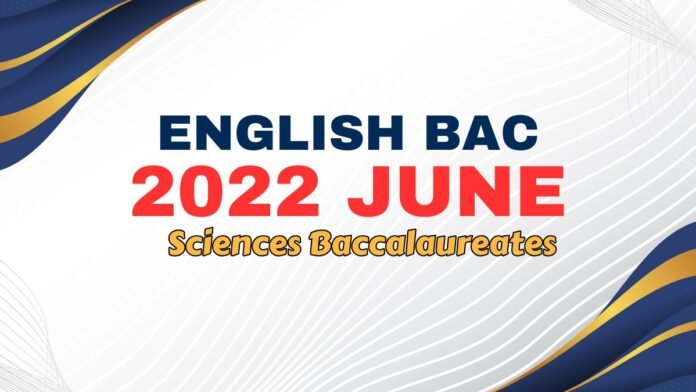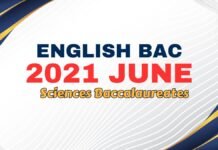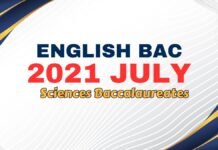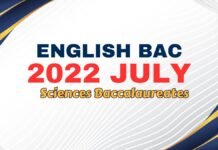This is a printable version of the Baccalaureate English National Exam Sciences 2022 June session. A PDF version is included for free download. The Baccalaureate English National Exams are key for student success. They play a vital role in shaping students’ academic future. Success in these exams reflects their language proficiency and readiness for higher education or professional paths.
Download Reading Baccalaureate English National Exam Sciences 2022 June
Download Language and Writing Baccalaureate English National Exam Sciences 2022 June
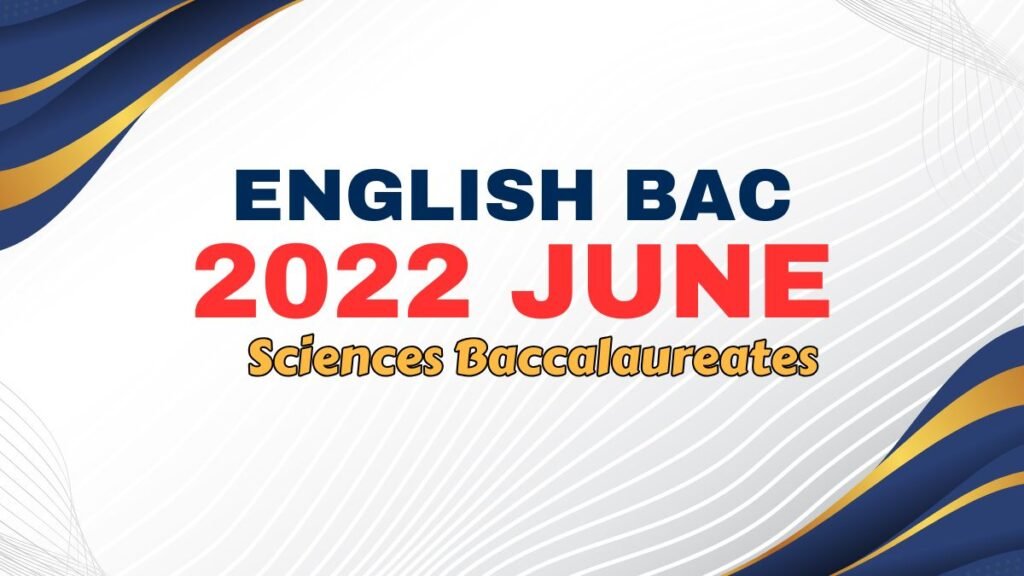
This is a printable version of the Baccalaureate English National Exam Sciences 2022 June session, available for free download in PDF format. The Baccalaureate English National Exams are pivotal for student success, shaping their academic futures so that they can excel in higher education and global professional environments. These exams assess language proficiency, critical thinking, and communication skills, preparing students for a world where English is a vital tool for academic and professional advancement.
Overview of Baccalaureate English National Exams
The Baccalaureate English National Exams form a cornerstone of Morocco’s secondary education system, evaluating English proficiency across academic streams such as Sciences, Arts, and Letters. Designed to align with international language standards, these exams test a comprehensive range of skills, including reading comprehension, grammatical accuracy, vocabulary usage, and written expression. By emphasizing practical language application, they prepare students for university studies and careers in fields requiring global communication, such as technology, science, and business.
Unlike traditional assessments that rely heavily on memorization, the Baccalaureate English National Exams encourage students to engage critically with authentic texts, apply grammar contextually, and express ideas coherently. This approach fosters skills essential for real-world scenarios, such as conducting academic research, collaborating internationally, or communicating professionally. Administered annually, these exams serve as a standardized measure of language proficiency, influencing university admissions and scholarship opportunities across Morocco.
In Morocco’s multilingual educational landscape, the Baccalaureate English National Exams reflect the country’s commitment to fostering global competence. English proficiency is increasingly critical in a globalized world, where it serves as a lingua franca for academic discourse and professional interactions. By excelling in these exams, students demonstrate their readiness to contribute to Morocco’s growing role in international education and industry.
Structure of English National Exams
The exams are structured into three core sections: Reading, Language, and Writing. The Reading section challenges students to analyze texts from diverse sources, such as narratives, scientific articles, or cultural reports, testing their ability to identify main ideas, infer meanings, and understand vocabulary in context. The Language section focuses on grammatical accuracy, word formation, and functional language use, requiring students to manipulate sentence structures and select appropriate terms. The Writing section involves producing structured responses, such as essays or paragraphs, to demonstrate creativity, coherence, and linguistic precision.
This tripartite structure ensures a balanced assessment of both receptive and productive language skills. Each section is carefully designed to be challenging yet accessible, allowing students to showcase their proficiency in varied contexts. The consistency of this format across different streams enables targeted preparation, helping students build confidence and competence in their English abilities.
Significance of the Exams
The Baccalaureate English National Exams are more than academic milestones; they are gateways to higher education and global career opportunities. High scores can significantly enhance university applications, particularly for competitive programs in fields like medicine, engineering, and international relations. The skills developed during preparation—critical analysis, clear communication, and structured writing—are transferable across disciplines, forming a foundation for lifelong learning and professional success.
Moreover, these exams promote Morocco’s vision of multilingual education, equipping students to engage with global academic and professional communities. Proficiency in English opens doors to international scholarships, research collaborations, and employment in multinational companies, positioning students as global citizens capable of contributing to Morocco’s development.
Challenges Faced by Students
Preparing for the Baccalaureate English National Exams presents several challenges, including time management, interpreting complex texts, and mastering advanced grammatical structures. The variety of tasks, from multiple-choice questions to open-ended writing, requires adaptability and strategic planning. Students must balance creativity with accuracy, particularly in the Writing section, where clarity and coherence are paramount. Additionally, understanding nuanced vocabulary and cultural contexts in reading passages can be demanding, especially for students with limited exposure to diverse texts.
Overcoming these challenges requires consistent practice, exposure to varied reading materials, and targeted exercises to build specific skills. By addressing these hurdles, students develop resilience and confidence, which are essential for success in the exams and beyond.
Skills Gained from Preparation
Preparation for these exams fosters a range of skills, including critical thinking, vocabulary expansion, and effective communication. Students learn to analyze complex texts, articulate ideas clearly, and adapt their language to different contexts. These competencies are invaluable for academic research, professional presentations, and cross-cultural collaboration. Additionally, the exams cultivate discipline and time management, as students must navigate diverse tasks under pressure, skills that extend beyond the classroom to support lifelong learning and career success.
Baccalaureate English National Exam Sciences
The Baccalaureate English National Exam Sciences is specifically designed for students in scientific streams, such as physics, chemistry, and mathematics. This exam integrates language proficiency with scientific themes, ensuring students can communicate technical concepts effectively in English. By focusing on content relevant to their academic interests, the exam bridges language learning with scientific inquiry, preparing students for STEM careers where English is the primary medium of communication.
Reading passages in the Baccalaureate English National Exam Sciences often explore scientific discoveries, technological innovations, or societal issues related to science, making the content engaging and relevant. The exam emphasizes vocabulary and grammar suited to technical contexts, enabling students to articulate complex ideas with precision. This interdisciplinary approach not only assesses language skills but also inspires students to connect their scientific knowledge with global challenges, fostering a deeper appreciation for the role of science in society.
Success in this exam equips students to engage with international scientific communities, pursue advanced studies, and contribute to global research and innovation. It also highlights the importance of English as a tool for disseminating scientific knowledge, a skill increasingly vital in today’s interconnected world.
Reading Component in Sciences Exam
The Reading section features texts that highlight scientific achievements, societal impacts, or inspiring narratives relevant to science students. Tasks include justifying true/false statements, answering comprehension questions, completing sentences with text-based information, filling charts with numerical data, finding synonyms, and identifying pronoun references. These activities test students’ ability to extract key details, infer meanings, and understand context, fostering both language proficiency and scientific awareness.
By engaging with science-related texts, students develop critical reading skills and gain insights into the societal impact of scientific progress. This section not only enhances language abilities but also motivates students to explore the intersections of science and culture.
Language Tasks in Sciences Exam
The Language section assesses grammatical accuracy and vocabulary through a variety of exercises, such as correcting sentence mistakes, forming correct word forms from given roots, filling blanks with appropriate words from lists, rewriting sentences to maintain meaning, and completing conversational exchanges. These tasks often incorporate scientific or professional contexts, such as discussing educational initiatives or environmental solutions, requiring students to apply language skills practically.
These exercises ensure students can communicate precisely in academic and professional settings, a skill vital for writing research papers, presenting findings, or collaborating internationally. By mastering these tasks, students gain the confidence to express complex ideas clearly and accurately.
Writing Prompts in Sciences Exam
The Writing section requires students to address prompts related to scientific or societal issues, such as environmental challenges or educational reforms. Tasks may include completing paragraphs or writing articles, emphasizing clarity, coherence, and the use of specialized vocabulary. Students must balance technical terminology with accessible language to ensure their writing is effective for diverse audiences.
Success in this section demands practice in structuring arguments, using cohesive devices, and maintaining grammatical accuracy, all of which are essential for scientific communication. These skills prepare students for academic writing and professional correspondence in STEM fields.
Benefits of Sciences Exam
The Baccalaureate English National Exam Sciences not only assesses language proficiency but also fosters an appreciation for science’s role in society. By mastering this exam, students gain the confidence to pursue advanced studies in STEM fields, contribute to global research, and communicate effectively in international forums. The exam also inspires interest in innovation, aligning with Morocco’s goals of advancing scientific education.
Baccalaureate English National Exam Sciences 2022 June
The Baccalaureate English National Exam Sciences 2022 June was a significant session, featuring a reading passage about a Moroccan adventurer’s 30,000-kilometer journey across 23 African countries. This narrative emphasized themes of resilience, cultural diversity, and personal growth, inspiring students while testing their language proficiency. The exam’s tasks were designed to reflect real-world communication needs, blending adventure with academic rigor.
Reading Section in 2022 June Exam
The Reading section focused on the adventurer’s journey, highlighting his experiences and challenges. Students were tasked with:
- Justifying true/false statements about the adventurer’s planning and experiences.
- Answering questions about travel methods, challenges faced, and documentary funding.
- Completing sentences with information from the text.
- Filling charts with figures like distances and dates.
- Finding synonyms for terms like “generosity” and “views.”
- Identifying pronoun references, such as “it” or “they.”
These tasks tested students’ ability to analyze narrative texts, extract key details, and understand context, fostering both language proficiency and cultural awareness. The adventurous theme made the section engaging, encouraging students to connect language learning with real-world exploration.
Language Section in 2022 June Exam
The Language section included a variety of exercises to assess grammatical accuracy and vocabulary:
- Correcting sentence mistakes, such as errors in verb tenses or prepositions.
- Forming correct word forms, like transforming “involve” into “involvement.”
- Filling blanks with words like “brought about” or “green” in contexts related to social media or environmental issues.
- Rewriting sentences using structures like wish clauses, reported speech, or “so that” constructions.
- Choosing appropriate responses for conversational exchanges, such as reacting to opinions or good news.
- Completing conversations, such as complaining about hotel services and responding appropriately.
These tasks emphasized practical language application, preparing students for academic and everyday communication scenarios. They required precision and adaptability, skills essential for professional and academic success.
Writing Section in 2022 June Exam
The Writing section comprised two tasks:
- Completing a paragraph about school celebrations for Women’s Day, requiring logical organization and clear examples.
- Writing an article for
